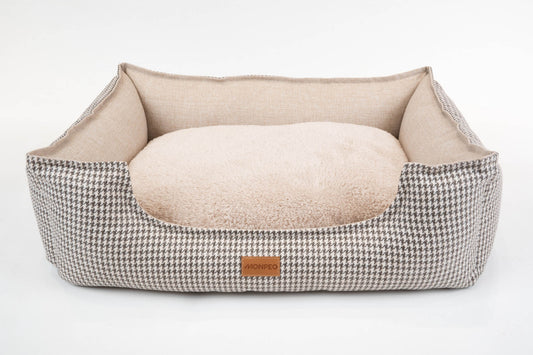We were both working tirelessly and barely at home, never mind taking on extra responsibilities. I remember it so clearly. My husband asked me to visit a local rescue home to see if we could look at the process of adopting a rescue dog. I was not ready. Working 14 hour days couldn’t fit with the needs of a dog so I was insistent we would only go and look at it, scope out the process and see. How foolish was I?
The day we visited the sanctuary we were only shown one dog - a rather sorry-looking pup named Yogi. He'd been picked up on a road in Wales after being abandoned. He'd been beaten and was badly neglected but possessed such hopeful eyes we knew we had to take him home. Naturally, I wasn’t looking to adopt at the time but six-month-old Yogi somehow managed to change my mind - and subsequently changed our lives.
Who rescued whom?
Yogi was my best friend and the reason we ended up having our baby. He made us completely reassess our priorities and introduced us to a whole new way of living. Fresh air, new routines and unconditional love. He struggled initially but quickly became our beloved boy - the most perfect little terrier with a heart of gold.
Far too short
We only had him for seven years in the end. He was fine and then he wasn’t. He passed far too quickly and in very unexpected circumstances. It was traumatic. I knew it would be rough when he died but I had no idea. Put simply I was a wreck. I cried for days, I couldn’t get any work done, and worst of all I was too embarrassed to make a huge deal of it.
Dealing with the grief
As pet owners I’m sure we can all relate to this pain. Losing a beloved pet - a cat, dog, horse or any animal you form a bond with is emotionally devastating. In spite of this it isn’t always recognised just how impactful the loss can be on our mental and physical health. Just in the same way that having a pet improves all aspects of health, losing one is equally detrimental. Following the loss of Yogi, the symptoms of acute grief lasted a long time for me and was just as intense as the loss of a family member. However, the main difference in the loss of a pet is that social and community support aren’t as present.
Life goes on
I have looked into this and it is very rare for someone who’s lost a pet to ask their employer for time off to grieve because there is a fear of appearing over-sensitive, immature or emotionally weak because of "an animal". This is wrong. My friend recently lost her cat after 13 years. Thankfully, her boss knew the heartbreak of losing a pet as she’d lost her dog, and she told her to take two days off. Had she not been caught crying in the loo during lunch she wouldn’t have dared to ask for time off. Studies show that social support is critical to recovering from all kinds of grief. So, not only are we being robbed of valuable support when our pets pass away, but we’re adding extra layers of stress on ourselves to cope with it and to internalise it.
Coping with the loss alone
We can often feel embarrassed or even ashamed at how much heartbreak we’re feeling that we hesitate to disclose our innermost feelings to those around us - including our loved ones. That additional layer of shame then complicates our recovery process because it makes it longer and more complex than it needs to be. Not only does losing a pet create a significant void in our lives, it also leaves ripples of grief that extend beyond the loss of our animal. The loss of a pet can also create changes to our daily routines that can be just as distressing.
Changing the daily routine
Caring for pets helps us create responsibilities and a schedule around which we plan our days. For example, with a dog we’ll often go out and exercise or socialise with other dog owners. The cat parents we know will often find themselves waking up early to feed them. These are habits formed over many years. Losing a pet leaves a huge gap in routines effectively compounding the feeling of initial grief and adding to the sense of discombobulation.
Finding ways to talk
In order for us to properly recover from the loss of a pet we have to recognise these changes and find ways of dealing with them. That means we need to seek social support from people we know will understand and sympathise with our feelings. It is also important to reorganise our routines and daily activities in order not to feel the gap made by their loss in the longer term.
Get support through the pain
But most importantly, it’s time to recognise that grieving pet owners need support and consideration. While it is up to us to cope with our emotional pain after a pet passes away, it’s also important for others to give us the validation to deal with it. It is the only way we can heal.
So, if you know someone who has lost a pet, be gentle with them and understand that they’re legitimately in pain. And if you’re a pet owner who’s experiencing a loss, know that it’s OK to be sad and be sure to talk to someone about it.









